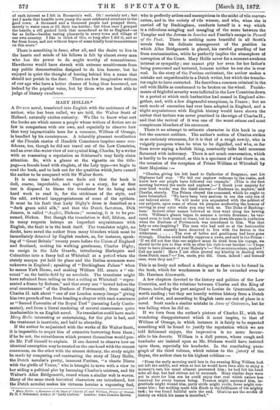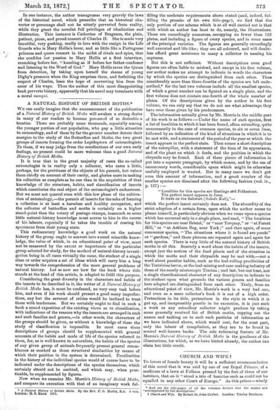MARY HOLLIS" A DIITCH novel, translated into English with the
assistance of its author, who has been called, we are told, the Walter Scott of Holland, naturally excites curiosity. We like to know what sort the books are which amuse a people whose writers of fiction are so few in comparison with our own, and especially to observe how that very impracticable hero for a romance, William of Orange, is handled by his countryman. A tolerably pleasant recollection of the Flemish stories of Hendrik Conscience inspires some con- fidence, too, though he did not travel out of the Low Countries, and an over-the-water view of our cynical king, Charles, by a writer with so reassuring a reputation as Schimmel's may fairly claim attention. So, with a glance at the vignette on the title- page—a female head with ringlets, of the Lely type—we begin to read the book, and to look out for the qualities which.have caused the author to be compared with Sir Walter Scott.
It is some time before one finds out that the book is dull, coarse, improbable, and vapid as a story, for at first one is disposed to blame the translator for its being such hard work to read it, for the stickiness of the style, and the odd, awkward inappropriateness of some of the epithets. It must be his fault that Lady Digby's dress is described as a "dark green solid silk," and that the Dutch factotum, Dirk Janson, is called "Anglice, Dickens ;" meaning, it is to be pre- sumed, Dickon. But though the translation is dull, lifeless, and in many respects betrays an imperfect acquaintance with English, the fault is in the book itself. The translator might, no doubt, have saved the author from many blunders which must be immediately detected by English readers, as, for instance, speak- ing of "Great Britain" twenty years before the Union of England and Scotland, making his walking gentleman, Charles Digby, an ensign in the Life Guards, introducing Harlequin and Columbine into a fancy ball at Whitehall at a period when the stately masque yet held its place and the Italian mummers were unknown in England ; speaking of "Buckingham Palace" when he means York House, and making William III. create a " vis- count " on the battle-field by an accolade. The translator might have refrained from telling us that a ceiling at Whitehall "repre- sented a fresco by Ruben's," and that every one "bowed before the oval countenance" of the Duchess of Portsmouth ; from making Charles U. talk about "one of our London money-lumps" giving him two pounds of tea; from heading a chapter with such a sentence as "Second Favourite of the Royal Turf" (meaning Lady Castle- maine), and from a literal rendering of several coarsenesses quite inadmissible in an English novel. No translation could have made Mary Ltd& interesting or entertaining, for the plot is bad, and the treatment is inartistic, and bald to absurdity.
If the author be accivainted with the works of Sir Walter Scott, it is impossible to acquit him of extensive borrowing from them ; if he be not, the coincidences which present themselves would puz- zle Mr. Puff himself to explain. If one desired to observe how an identical conception may be treated on the one hand with the utmost coarseness, on the other with the utmost delicacy, the study might be made by comparing and contrasting the story of Mary Hollis, the Dutch novelist's pretty, innocent Puritan, "a chaste Diana with the girdle of Venus," who is brought to town with a view to her aiding a political plot by becoming Charles's mistress, and Sir Walter's Alice Bridgenorth, round whom a similar web is woven. Many of the same stock historical characters are introduced, but the Dutch novelist makes his virtuous heroine a vapouring fool, Mary Hollis: a Romance of Me Days of Charles II. and William, Prince of Orange. By H. J. Schimmel, Author of "Lady Carlisle." Loudon: John Camden liotten. who is perfectly artless and unsuspicious in the midst of vile conver- sation, and in the society of vile women, and who, when she is carried off by Buckingham, conducts herself in a way which is a ridiculous mingling and mangling of the scene between the Templar and the Jewess in Ivanhoe and Fenella's escape in Peverit of the Peak. There is nothing more beautiful in all Scott's novels than his delicate management of the position in which Alice Bridgenorth is placed, his careful guarding of her from contamination, while he perfectly implies the atmosphere of corruption of the Court. Mary Hollis never for a moment awakena interest or sympathy ; one cannot pity her even for her father'a being persecuted and tortured, because neither he nor she is ever real. In the story of the Puritan enthusiast, the author makes a. mistake not unpardonable in a Dutch writer, but which the transla- tor ought to have corrected. He describes a common criminal in the cell with Hollis as condemned to be broken on the wheel. Punish- ments of frightful severity were inflicted in the Low Countries down. to a period at which such barbarities had ceased in England alto- gether, and, with a few disgraceful exceptions, in France ; but no such mode of execution had ever been adopted in England, and a. slight acquaintance with English history would have shown the author that torture was never practised in the reign of Charles II., and that the revival of it was one of the worst crimes and most. conspicuous blunders of his successor.
There is no attempt to estimate character in this book in any but the coarsest outlines. The author's notion of Charles strikes. us as curiously erroneous, for it is that of a rough rowdy, who is vulgarly pompous when he tries to be dignified, and who, so far from never saying a foolish thing, constantly talks bald nonsense flavoured with indecency. There is not much conversation, which. is hardly to be regretted, as this is a specimen of what there is, on- the occasion of the reception of Prince William at Whitehall by their Majesties :- "Charles, giving his left hand to Catherine of Braganza, met hie Highness half way. We bid our nephew welcome in the realm, and know how our people have followed our example.' (This is the first- meeting between the uncle and nephew.)—' I thank your majesty for your kind words,' was the timid answer.—' Embrace us, nephew,' said, Charles, sternly. The Prince obeyed the command, which he ought to. have forestalled. 'We have been very anxious to see the only son of our beloved sister. We will make you acquainted with the noblest of our subjects, upon some of whom we purpose conferring the honour of serving in your suite while you stay with us. The Duke of Bucking- ham.' Several other names followed as they went along the bowing. rows. William's glance began to assume a certain firmness ; he ven- tured even to look round at times, but he cast down his eyes in confusion when the Duchess of Portsmouth was introduced to him. Was that- lady so awe-inspiring ? The man who had said so at the fashionable, Court would scarcely have deserved to live with the brutes in the wilderness The row of ladies and gentleman had been gone through. Charles could hardly suppress a yawn, and said to the Prince If we did not fear that our nephew must be tired from his voyage, we should invite you to dine with us after his visit to our brother.'—' I hope- later to have pleasure of your Majesty's.'—' Not so ceremonious, nephew Call me uncle ! Have I not often proved my kinship in dealing with those Dutch oxen?'—' Yes, uncle, you did. Oxen, indeed ! and horned' ones, were they not?"' This is as lively and refined a dialogue as there is to be found in the book, which for woodenness is not to be exceeded even by, Mr. Harrison Ainsworth.
A few chapters devoted to the history and politics of the Low. Countries, and to the relations between Charles and the King of France, including the part assigned to Louise de Querouaille, are worth reading ; but they are heavily written history from a Dutch point of view, and according to English taste are out of place in e novel. Scott made a similar mistake in Anne of Geierstein, but he was failing when he did so.
If we turn from the author's picture of Charles II., with the wondering disappointment which it must inspire, to that of William of Orange, in which instance it is fairly to be expected something will be found to justify the reputation which we are told Schimmel enjoys, the impression is no more favour- able to his deserts. William is a dull person, whose cough and, headache are insisted upon as Mr. Dickens would have insisted upon them, especially his headache. In the .,concludina para- graph of the third volume, which relates to the ..iiotory of the Boyne, the author rises to his highest sublime :—
" From the early morning until late in the evening Bing William had, not left the saddle, and when at last he would have been able to enjoy a. moment's rest, his usual ailment prevented him ; he had felt his head. ache all day, but had striven not to succumb. Many similar days were yet in store for him ere he could enjoy that rest which nature has' reserved for every human being. Treason might surround him, in- gratitude might wound him, party strife might revile, fever might con- sume him ; but nothing made him flinch in the fulfilment of his mighty task ; he was found faithful unto the end. Glorious are the scrolls of history on which his name is inscribed." In one instance, the author transgresses very gravely the laws of the historical novel, which prescribe that an historical cha- racter or personage shall not be utterly perverted from reality, while they grant the novelist full privileges of idealization and illustration. This instance is Catherine of Braganza, the plain, patient, pious, and proud consort of Charles II. She is made very beautiful, very gushing, madly in love with the ensign in the Life Guards who is Mary Hollis's lover, and so little like a Portuguese princess and queen consort in the midst of rivals and spies, that she confides her passion to Mary Hollis at a first interview, crouching before her, "kneeling as if before her father-confessor and listening to the Word of God." Mary Hollis saves the Queen from detection, by taking upon herself the shame of young Digby's presence when the King surprises them, and forfeiting the respect of Charles, loses the hope of converting him from the error of his ways. Thus the author of this most disappointing book perverts history, apparently that his novel may terminate with a moral manqué.



































 Previous page
Previous page